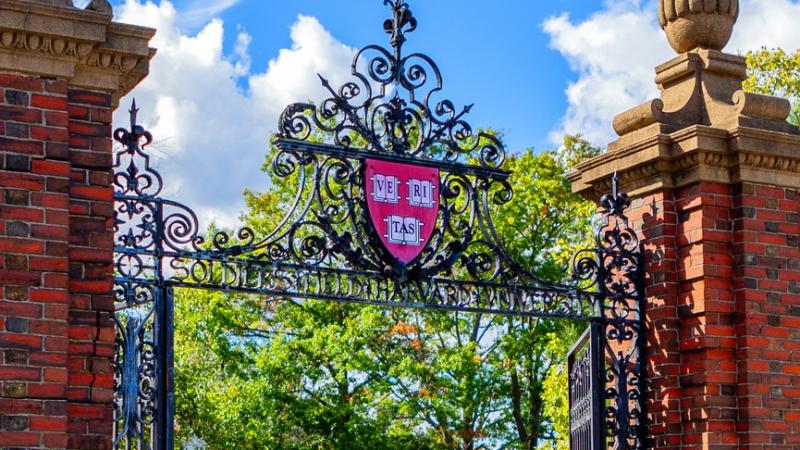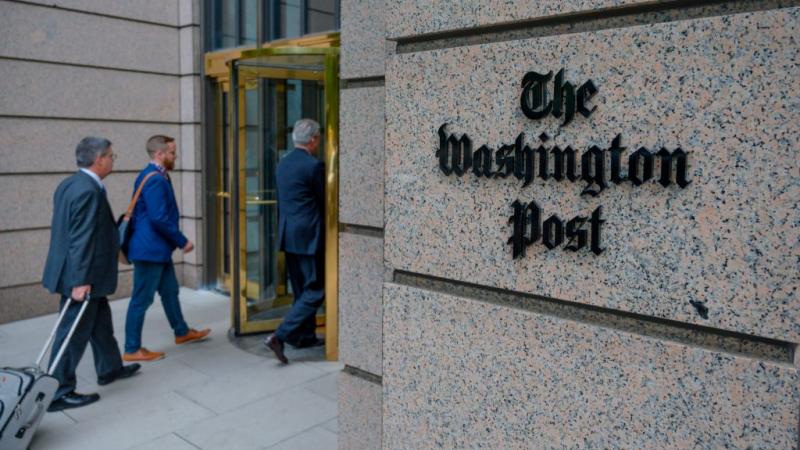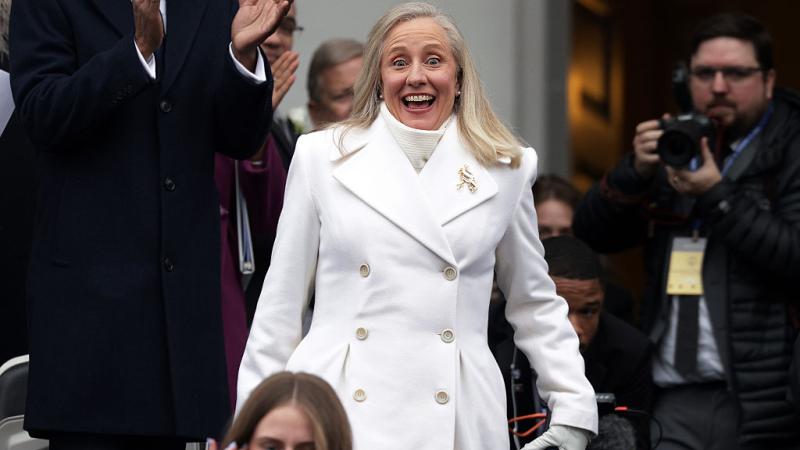Chinese military-tied company appears to be choosing new hires at Ford battery plant company
The Chinese military affiliated battery manufacturer CATL appears to be in charge of hiring for roles at the Ford plant that executives said would be wholly owned and operated by the American company.
A Chinese company appears to be in charge of hiring workers for Ford’s new battery plant in Michigan, contradicting the company’s statements that it will be an American-owned and operated project, and amplifying concerns from locals about potential national security implications.
The plant has generated significant controversy because of Ford’s partnership with China-based Contemporary Amperex Technology Limited, known as CATL, which closely collaborates with the Chinese military and government. The U.S. Defense Department earlier this year marked CATL as a Chinese Military Company to warn American firms about the risks of doing business.
Despite the security concerns about its partner, Ford has promised that the battery manufacturing facility, which the company says will help it develop a reliable U.S.-based supply of electric vehicle batteries in Marshall, Michigan, would be completely owned and operated by the American firm. The only contribution from CATL, the company has said, will be Ford’s licensing of its proprietary battery technology.
Who is running the show?
At the same time, online job listings on multiple recruiting platforms show that CATL’s American subsidiary—Contemporary Amperex Technology Kentucky (CATK)—has posted job listings for roles at the factory, seemingly contradicting Ford’s assurances and revealing a far more active role in management by the Chinese company.
The concerns about the plant follow previous public backlash in Michigan regarding another battery plant, this one set to be operated by China-based manufacturer Gotion, which has signed a development agreement with a local township for its own facility. Gotion’s ties to the Chinese Communist Party pushed newly elected board members to rescind the deal and allege the Chinese firm had provided inducements to encourage the original approval.
The Ford plant has drawn scrutiny from Republicans in the Michigan legislature who are concerned that the state government failed to properly vet the project and Ford’s partners in the endeavor.
"From the outset of the corrupted ‘deal’ concocted and championed between Governor Whitmer, Ford, the Michigan Economic Development Corporation (MEDC) and China-based and Chinese Communist Party-tied (CCP) Contemporary Amperex Technology Limited (CATL) has been fast moving and in secret,” Joseph Cella, former U.S. ambassador to Fiji and Director of the Michigan-China Economic Security Review Group told Just the News.
Allegations no due diligence performed
“In their haste, unconscionably, parties to this ‘deal’ performed no strict scrutiny or due diligence, defying the directives given by our national security and intelligence agencies to state and local governments and American corporations when dealing with China-based companies, jeopardizing our national security and taxpayer dollars,” Cella added.
Cella said the evidence showing CATL’s subsidiary may be hiring directly for the Ford project is just the latest red flag on the project. He said that the deal had “many red flags” from the beginning, including CATL’s designations by the U.S. government and evidence uncovered by Congress that CATL has connections to forced labor in China.
Neither the Ford Motor Company nor CATK responded to requests for comment from Just the News. CATL has said that the Pentagon’s designation is a “mistake” and that it has “never engaged in any military-related business or activities.”
Ford is moving ahead with the Michigan project—called BlueOval Battery Park Michigan—despite the twin political controversies of using Chinese-licensed technology and efforts by Republicans in Congress to strip tax subsidies from green projects implemented by the Biden administration.
Ford: First step in reshoring
The quintessential American car company defends its decision to license technology from CATL by arguing that it is an important first step in re-shoring manufacturing in the United States. The battery that Ford is licensing, called a lithium-iron-phosphate battery, was invented in the United States in the 1990s, but says there is currently no option to produce them domestically without Chinese know-how.
"How can we compete if we don't have this technology? Somebody has to take the lead to do this," Ford’s vice president of technology platform programs and electric vehicles Lisa Drake told Axios. “I'm convinced this is the right thing to do for the United States.”
Ford touts the project on its website as an “historic first step” to increasing the competitiveness of American companies in the global EV market.
"An American automotive company is manufacturing — without relying on a foreign joint venture — LFP battery cells and battery packs domestically with American workers for American-assembled next-generation electric vehicles,” the company says.
The website also says the facility will be “wholly owned and operated by Ford.”
Despite claims of being "wholly operated by Ford," job listings on various internet hiring platforms, including LinkedIn and ZipRecruiter, raise questions about whether Ford’s battery park is really as independent from its Chinese partner as its statements seem to suggest.
There is no public record that CATK has, or plans to build, a production facility in Marshall, Michigan separate from the Ford facility, yet it is openly advertising manufacturing process engineer positions at an unspecified location in Marshall, Michigan.
“To better serve the global auto industry electric vehicle trend in the United States, CATL, through its U.S.-based subsidiary Contemporary Amperex Technology Kentucky, LLC (CATK) is seeking multiple full-time and dedicated Manufacturing Process Engineers to join our local team,” the listing reads.
Chinese companies recruiting for Ford plant
Ford claims that its new plant will be wholly owned and operated by the company, while China-based CATL is actively advertising job positions for its subsidiary at what appears to be the Ford facility. Ford did not respond to questions seeking clarification about CATK/CATL’s hiring role at the facility or if the job was indeed for its new plant.
The online hiring platform ZipRecruiter also shows several listings by CATL for its American subsidiary, also for the Marshall, Michigan location. These include an environmental, health, and safety manager, an administrative service manager, a manufacturing manager, and a handful of other positions.
Like the listing on LinkedIn, these postings indicate that the prospective employee would be working for CATL’s American subsidiary directly but notes that the China-based parent is responsible for seeking the employees.
As controversy swirls around the Ford plant in Michigan, Cella told Just the News that the one question that has never been asked of the American company is: why is CATL and its American subsidiary apparently hiring for positions at its independent manufacturing facility?
The deal has drawn scrutiny from Republican legislators in Michigan, who are baffled by the Ford’s decision carry out the partnership with CATL despite the federal government’s warnings about the company’s affiliation with the Chinese military, especially because there are alternative companies in friendly countries like Japan and South Korea.
Early this year, Michigan lawmakers urged Governor Whitmer to clawback the taxpayer subsidies awarded to Ford for the BlueOval project because of the company’s work with CATL. Rep. Sarah Lightner called for a more comprehensive review to address the “national security threats” and “financial risks” to supporting the plant.
Longstanding relationship between Whitmer and China
Despite the numerous national security red flags, Gov. Whitmer and the Michigan Economic Development Corporation have moved forward with millions of dollars in subsidies for the project, citing the creation of new jobs and an opportunity to expand manufacturing on U.S. soil. Whitmer has called the plan a “generational investment” for Michiganders. Overall, the state is promising approximately $850 million in subsidies and incentives to aid Ford in completing the project.
A Michigan Economic Development Corporation official said that the panel was aware of CATL’s close affiliation with the Chinese government before awarding the funds, but said China’s near monopoly on the technology required Ford to license the batteries.
This is not the first time a project involving a Chinese company has been approved and funded by the Michigan development corporation. A deal for Chinese battery manufacturer Gotion to build a plant in Green Charter Township, Michigan came under scrutiny from locals over environmental impacts, disruption to their community, and the company’s China ties.
Despite previous claims to the contrary by company executives, Gotion recently admitted in a Foreign Agents Registration Act (FARA) filing that the company is “partially subsidized through government funding supplied by the People's Republic of China.” Reports show that Gotion is wholly owned by its parent company, Gotion High-tech Co., which participated in programs designed to acquire military technology for China and employs at least 923 Chinese Communist Party members.
Critics were also concerned that Chinese spies could use the Gotion plant as a launching point for espionage against the National Guard base Camp Grayling which is in close proximity to the proposed site.
The Facts Inside Our Reporter's Notebook
Links
- Contemporary Amperex Technology Limited
- marked CATL as a Chinese Military Company
- Gotion’s ties to the Chinese Communist Party
- said that the Pentagonâs designation
- told Axios
- touts the project on its website
- actively advertising job positions for its subsidiary
- shows several listings by CATL
- working for CATLâs American subsidiary
- drawn scrutiny
- a more comprehensive review
- $850 million in subsidies and incentives
- filing
- participated in programs designed to acquire military technology
- employs at least 923 Chinese Communist Party members
- Chinese spies could use the Gotion plant














